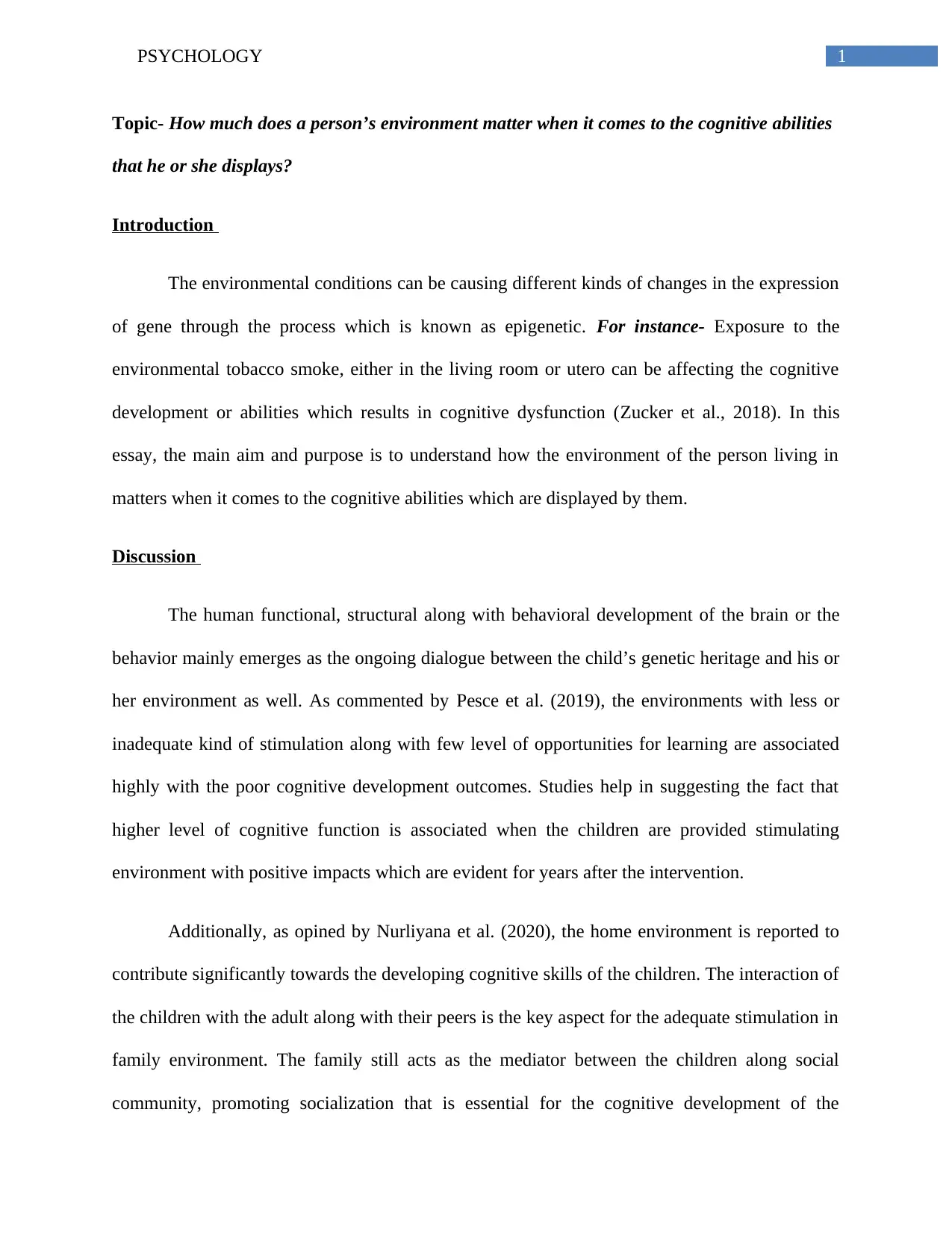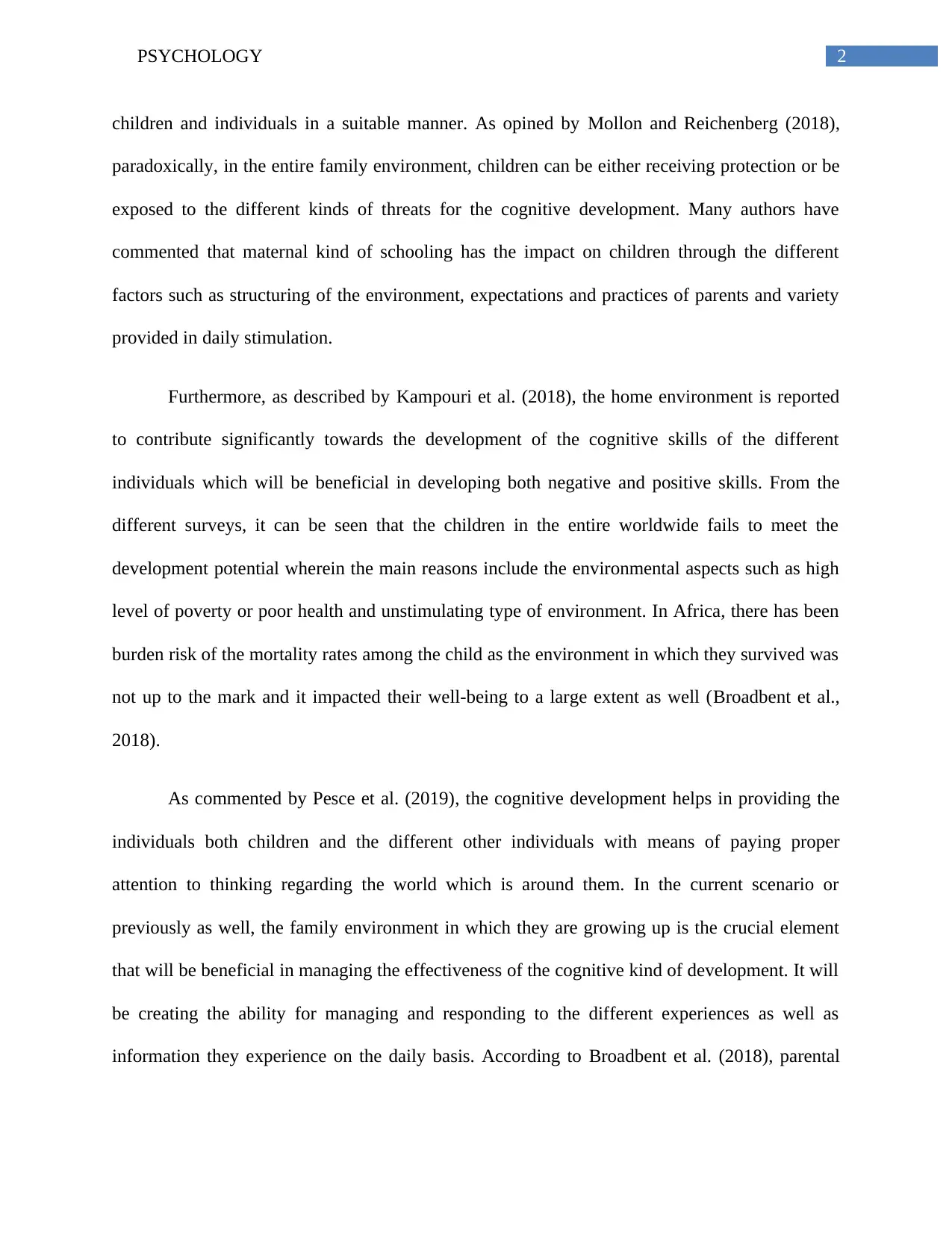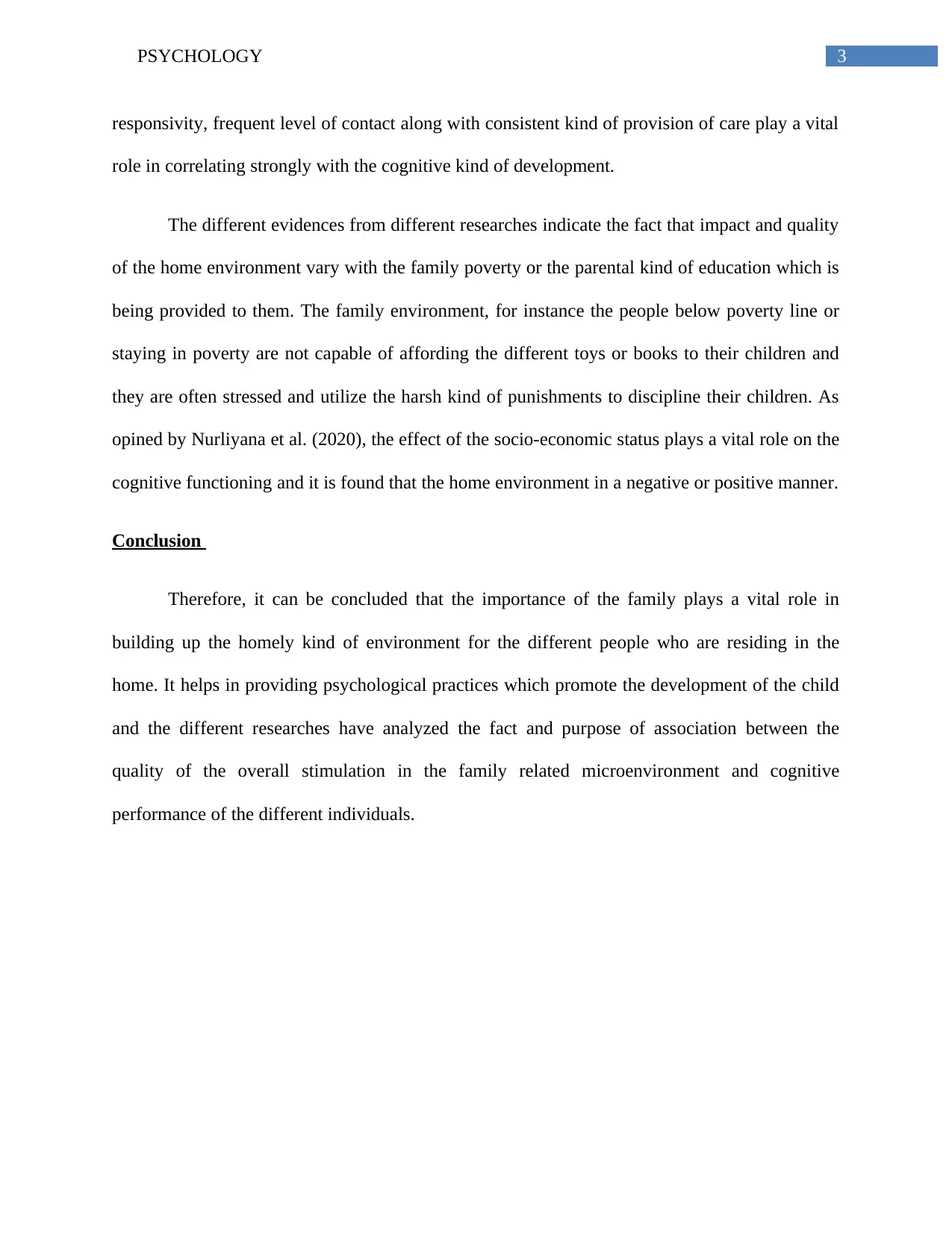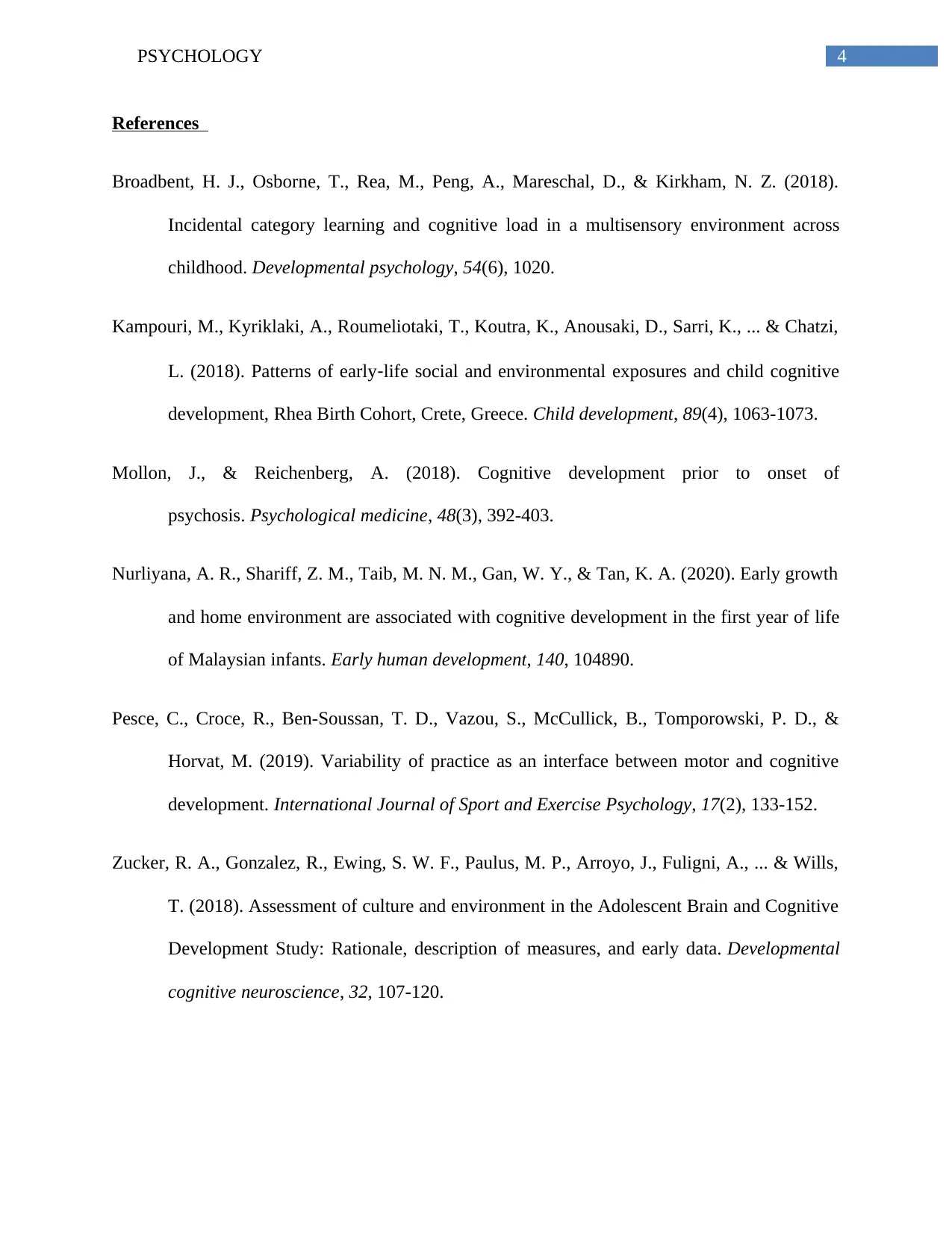The Role of Environment in Shaping Cognitive Abilities: Psychology
VerifiedAdded on 2022/07/28
|5
|1224
|17
Essay
AI Summary
This essay examines the profound influence of a person's environment on their cognitive abilities. It explores how environmental factors, such as exposure to tobacco smoke and the quality of the home environment, can impact cognitive development. The essay highlights the role of stimulation, family interaction, and socio-economic status in shaping cognitive skills. It discusses how stimulating environments, parental responsivity, and access to resources like books and toys contribute to better cognitive outcomes. The essay also considers the negative impacts of poverty and harsh parenting styles on cognitive function, emphasizing the importance of a supportive and enriching environment for optimal cognitive development. The essay references multiple studies to support its arguments and concludes that the family environment plays a crucial role in fostering cognitive abilities, underscoring the need for interventions to improve environmental conditions for children's cognitive growth.

Running head: PSYCHOLOGY
Psychology
Name of the Student
Name of the University
Author note
Psychology
Name of the Student
Name of the University
Author note
Paraphrase This Document
Need a fresh take? Get an instant paraphrase of this document with our AI Paraphraser

1PSYCHOLOGY
Topic- How much does a person’s environment matter when it comes to the cognitive abilities
that he or she displays?
Introduction
The environmental conditions can be causing different kinds of changes in the expression
of gene through the process which is known as epigenetic. For instance- Exposure to the
environmental tobacco smoke, either in the living room or utero can be affecting the cognitive
development or abilities which results in cognitive dysfunction (Zucker et al., 2018). In this
essay, the main aim and purpose is to understand how the environment of the person living in
matters when it comes to the cognitive abilities which are displayed by them.
Discussion
The human functional, structural along with behavioral development of the brain or the
behavior mainly emerges as the ongoing dialogue between the child’s genetic heritage and his or
her environment as well. As commented by Pesce et al. (2019), the environments with less or
inadequate kind of stimulation along with few level of opportunities for learning are associated
highly with the poor cognitive development outcomes. Studies help in suggesting the fact that
higher level of cognitive function is associated when the children are provided stimulating
environment with positive impacts which are evident for years after the intervention.
Additionally, as opined by Nurliyana et al. (2020), the home environment is reported to
contribute significantly towards the developing cognitive skills of the children. The interaction of
the children with the adult along with their peers is the key aspect for the adequate stimulation in
family environment. The family still acts as the mediator between the children along social
community, promoting socialization that is essential for the cognitive development of the
Topic- How much does a person’s environment matter when it comes to the cognitive abilities
that he or she displays?
Introduction
The environmental conditions can be causing different kinds of changes in the expression
of gene through the process which is known as epigenetic. For instance- Exposure to the
environmental tobacco smoke, either in the living room or utero can be affecting the cognitive
development or abilities which results in cognitive dysfunction (Zucker et al., 2018). In this
essay, the main aim and purpose is to understand how the environment of the person living in
matters when it comes to the cognitive abilities which are displayed by them.
Discussion
The human functional, structural along with behavioral development of the brain or the
behavior mainly emerges as the ongoing dialogue between the child’s genetic heritage and his or
her environment as well. As commented by Pesce et al. (2019), the environments with less or
inadequate kind of stimulation along with few level of opportunities for learning are associated
highly with the poor cognitive development outcomes. Studies help in suggesting the fact that
higher level of cognitive function is associated when the children are provided stimulating
environment with positive impacts which are evident for years after the intervention.
Additionally, as opined by Nurliyana et al. (2020), the home environment is reported to
contribute significantly towards the developing cognitive skills of the children. The interaction of
the children with the adult along with their peers is the key aspect for the adequate stimulation in
family environment. The family still acts as the mediator between the children along social
community, promoting socialization that is essential for the cognitive development of the

2PSYCHOLOGY
children and individuals in a suitable manner. As opined by Mollon and Reichenberg (2018),
paradoxically, in the entire family environment, children can be either receiving protection or be
exposed to the different kinds of threats for the cognitive development. Many authors have
commented that maternal kind of schooling has the impact on children through the different
factors such as structuring of the environment, expectations and practices of parents and variety
provided in daily stimulation.
Furthermore, as described by Kampouri et al. (2018), the home environment is reported
to contribute significantly towards the development of the cognitive skills of the different
individuals which will be beneficial in developing both negative and positive skills. From the
different surveys, it can be seen that the children in the entire worldwide fails to meet the
development potential wherein the main reasons include the environmental aspects such as high
level of poverty or poor health and unstimulating type of environment. In Africa, there has been
burden risk of the mortality rates among the child as the environment in which they survived was
not up to the mark and it impacted their well-being to a large extent as well (Broadbent et al.,
2018).
As commented by Pesce et al. (2019), the cognitive development helps in providing the
individuals both children and the different other individuals with means of paying proper
attention to thinking regarding the world which is around them. In the current scenario or
previously as well, the family environment in which they are growing up is the crucial element
that will be beneficial in managing the effectiveness of the cognitive kind of development. It will
be creating the ability for managing and responding to the different experiences as well as
information they experience on the daily basis. According to Broadbent et al. (2018), parental
children and individuals in a suitable manner. As opined by Mollon and Reichenberg (2018),
paradoxically, in the entire family environment, children can be either receiving protection or be
exposed to the different kinds of threats for the cognitive development. Many authors have
commented that maternal kind of schooling has the impact on children through the different
factors such as structuring of the environment, expectations and practices of parents and variety
provided in daily stimulation.
Furthermore, as described by Kampouri et al. (2018), the home environment is reported
to contribute significantly towards the development of the cognitive skills of the different
individuals which will be beneficial in developing both negative and positive skills. From the
different surveys, it can be seen that the children in the entire worldwide fails to meet the
development potential wherein the main reasons include the environmental aspects such as high
level of poverty or poor health and unstimulating type of environment. In Africa, there has been
burden risk of the mortality rates among the child as the environment in which they survived was
not up to the mark and it impacted their well-being to a large extent as well (Broadbent et al.,
2018).
As commented by Pesce et al. (2019), the cognitive development helps in providing the
individuals both children and the different other individuals with means of paying proper
attention to thinking regarding the world which is around them. In the current scenario or
previously as well, the family environment in which they are growing up is the crucial element
that will be beneficial in managing the effectiveness of the cognitive kind of development. It will
be creating the ability for managing and responding to the different experiences as well as
information they experience on the daily basis. According to Broadbent et al. (2018), parental
⊘ This is a preview!⊘
Do you want full access?
Subscribe today to unlock all pages.

Trusted by 1+ million students worldwide

3PSYCHOLOGY
responsivity, frequent level of contact along with consistent kind of provision of care play a vital
role in correlating strongly with the cognitive kind of development.
The different evidences from different researches indicate the fact that impact and quality
of the home environment vary with the family poverty or the parental kind of education which is
being provided to them. The family environment, for instance the people below poverty line or
staying in poverty are not capable of affording the different toys or books to their children and
they are often stressed and utilize the harsh kind of punishments to discipline their children. As
opined by Nurliyana et al. (2020), the effect of the socio-economic status plays a vital role on the
cognitive functioning and it is found that the home environment in a negative or positive manner.
Conclusion
Therefore, it can be concluded that the importance of the family plays a vital role in
building up the homely kind of environment for the different people who are residing in the
home. It helps in providing psychological practices which promote the development of the child
and the different researches have analyzed the fact and purpose of association between the
quality of the overall stimulation in the family related microenvironment and cognitive
performance of the different individuals.
responsivity, frequent level of contact along with consistent kind of provision of care play a vital
role in correlating strongly with the cognitive kind of development.
The different evidences from different researches indicate the fact that impact and quality
of the home environment vary with the family poverty or the parental kind of education which is
being provided to them. The family environment, for instance the people below poverty line or
staying in poverty are not capable of affording the different toys or books to their children and
they are often stressed and utilize the harsh kind of punishments to discipline their children. As
opined by Nurliyana et al. (2020), the effect of the socio-economic status plays a vital role on the
cognitive functioning and it is found that the home environment in a negative or positive manner.
Conclusion
Therefore, it can be concluded that the importance of the family plays a vital role in
building up the homely kind of environment for the different people who are residing in the
home. It helps in providing psychological practices which promote the development of the child
and the different researches have analyzed the fact and purpose of association between the
quality of the overall stimulation in the family related microenvironment and cognitive
performance of the different individuals.
Paraphrase This Document
Need a fresh take? Get an instant paraphrase of this document with our AI Paraphraser

4PSYCHOLOGY
References
Broadbent, H. J., Osborne, T., Rea, M., Peng, A., Mareschal, D., & Kirkham, N. Z. (2018).
Incidental category learning and cognitive load in a multisensory environment across
childhood. Developmental psychology, 54(6), 1020.
Kampouri, M., Kyriklaki, A., Roumeliotaki, T., Koutra, K., Anousaki, D., Sarri, K., ... & Chatzi,
L. (2018). Patterns of early‐life social and environmental exposures and child cognitive
development, Rhea Birth Cohort, Crete, Greece. Child development, 89(4), 1063-1073.
Mollon, J., & Reichenberg, A. (2018). Cognitive development prior to onset of
psychosis. Psychological medicine, 48(3), 392-403.
Nurliyana, A. R., Shariff, Z. M., Taib, M. N. M., Gan, W. Y., & Tan, K. A. (2020). Early growth
and home environment are associated with cognitive development in the first year of life
of Malaysian infants. Early human development, 140, 104890.
Pesce, C., Croce, R., Ben-Soussan, T. D., Vazou, S., McCullick, B., Tomporowski, P. D., &
Horvat, M. (2019). Variability of practice as an interface between motor and cognitive
development. International Journal of Sport and Exercise Psychology, 17(2), 133-152.
Zucker, R. A., Gonzalez, R., Ewing, S. W. F., Paulus, M. P., Arroyo, J., Fuligni, A., ... & Wills,
T. (2018). Assessment of culture and environment in the Adolescent Brain and Cognitive
Development Study: Rationale, description of measures, and early data. Developmental
cognitive neuroscience, 32, 107-120.
References
Broadbent, H. J., Osborne, T., Rea, M., Peng, A., Mareschal, D., & Kirkham, N. Z. (2018).
Incidental category learning and cognitive load in a multisensory environment across
childhood. Developmental psychology, 54(6), 1020.
Kampouri, M., Kyriklaki, A., Roumeliotaki, T., Koutra, K., Anousaki, D., Sarri, K., ... & Chatzi,
L. (2018). Patterns of early‐life social and environmental exposures and child cognitive
development, Rhea Birth Cohort, Crete, Greece. Child development, 89(4), 1063-1073.
Mollon, J., & Reichenberg, A. (2018). Cognitive development prior to onset of
psychosis. Psychological medicine, 48(3), 392-403.
Nurliyana, A. R., Shariff, Z. M., Taib, M. N. M., Gan, W. Y., & Tan, K. A. (2020). Early growth
and home environment are associated with cognitive development in the first year of life
of Malaysian infants. Early human development, 140, 104890.
Pesce, C., Croce, R., Ben-Soussan, T. D., Vazou, S., McCullick, B., Tomporowski, P. D., &
Horvat, M. (2019). Variability of practice as an interface between motor and cognitive
development. International Journal of Sport and Exercise Psychology, 17(2), 133-152.
Zucker, R. A., Gonzalez, R., Ewing, S. W. F., Paulus, M. P., Arroyo, J., Fuligni, A., ... & Wills,
T. (2018). Assessment of culture and environment in the Adolescent Brain and Cognitive
Development Study: Rationale, description of measures, and early data. Developmental
cognitive neuroscience, 32, 107-120.
1 out of 5
Related Documents
Your All-in-One AI-Powered Toolkit for Academic Success.
+13062052269
info@desklib.com
Available 24*7 on WhatsApp / Email
![[object Object]](/_next/static/media/star-bottom.7253800d.svg)
Unlock your academic potential
Copyright © 2020–2025 A2Z Services. All Rights Reserved. Developed and managed by ZUCOL.





